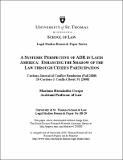| dc.description.abstract |
In the United States, ADR generally works as an alternative to the judiciary within the framework of the legal system, operating under what has been described as the shadow of the law. However, this assumption does not hold in most Latin American countries. That is, in Latin America, ADR usually is not a true alternative because it operates without a practical judicial option, without an effective shadow of the law. The promotion of ADR in dispute resolution systems that lack functional and effective courts has only exacerbated problems of access to justice by creating three tiers of justice: private arbitration, for those who can afford an arbiter; the justice system, for those who can afford a lawyer; and mediation centers, for those who can afford neither. The present article addresses the need to enhance the shadow of the law in Latin America, which is necessary to optimize effective dispute resolution systems in the region.This Article first addresses the issue of a pale shadow of the law in Latin America. It discusses the legal reform efforts in Latin America, and suggests that a systemic perspective could effectively link together and strengthen judicial reform efforts and the promotion of ADR. Second, this Article proposes a systemic reform framework for the enhancement of a well-defined shadow of the law in Latin America that includes three elements: sustainable domestic laws, a functional enforcement mechanism, and supportive social norms. This paper focuses on the first of these elements, sustainable domestic laws, and suggests consensus building as a preferable method for their creation. Finally, this Article concludes that enhancing the shadow of the law through citizen participation is essential to optimize dispute resolution systems in Latin America. |

